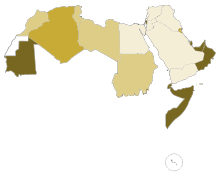- Member states of the Arab League
-
See also: Enlargement of the Arab League
The Arab League has 22 member states.
The Arab League was founded in Cairo in 1945 by Egypt, Iraq, Lebanon, Saudi Arabia, Syria, Transjordan (Jordan from 1946), and Yemen. There was a continual increase in membership during the second half of the 20th century, with additional 15 Arab states and 4 observers being admitted.
Israel is not a member despite 20% of its population being Palestinian Arab, nearly half the Jewish population being descended from Jews from Arab countries, and Arabic being an official language.
Chad is also not a member, despite Arabic being one of its two official languages, some 12% of Chadians identifying as Arab[1] and around 900,000 Arabic-speaking.[2]
The Sahrawi Arab Democratic Republic is not a member of the Arab League as it is recognized by only some Arab League states, while Western Sahara is recognized by the League as part of Morocco[citation needed], which controls nearly 80% of the territory.
Iran is not considered part of the Arab world, as the majority of its population are Persian, with only 2% Arab[3].
Contents
Temporary suspensions
Egypt's membership was suspended in 1979 after it signed the Egyptian–Israeli Peace Treaty, and the League's headquarters were moved from Cairo to Tunis. In 1987, Arab League states restored diplomatic relations with Egypt, and the country was readmitted to the League in 1989, and the League's headquarters were moved back to Cairo.[4]
The Libyan Arab Jamahiriya was suspended from the Arab League on 22 February 2011.[5] On 27 August 2011, the Arab League voted to restore Libya's membership by accrediting a representative of the National Transitional Council, which is partially recognised as the interim government of the country in the wake of Gaddafi's ouster from the capital of Tripoli.[6]
On 12 November 2011 the League passed a decree that would suspend Syria's membership if the government failed to stop violence against civilian protestors by 16 November amidst the 2011 uprising.[7] Despite this, the government did not yield to the League's demands.
Observer states
Four countries are observer states—a status that entitles them to express their opinion and give advice but denies them voting rights.[8] These are Eritrea, where Arabic is one of the official languages, as well as Brazil and Venezuela, which have large and influential Arab communities.[9] India is another observer to the Arab League.[8]
List of member states
Country Admission date Capital Area (km²) Population (2010)[10] Official languages  Algeria
Algeria1962-08-16 Algiers 2,381,741 34,586,184 Arabic  Bahrain
Bahrain1971-09-11 Manama 750 738,004 Arabic  Comoros
Comoros1993-11-20 Moroni 2,235 773,407 Comorian, Arabic, French  Djibouti
Djibouti1977-09-04 Djibouti 23,200 740,528 Arabic, Somali, Afar, French  Egypt
Egypt1945-03-22 Cairo 1,002,450 80,471,869 Arabic  Iraq
Iraq1945-03-22 Baghdad 438,317 29,671,605 Arabic, Kurdish  Jordan
Jordan1945-03-22 Amman 92,300 6,407,085 Arabic  Kuwait
Kuwait1961-07-20 Kuwait city 18,000 2,789,132 Arabic  Lebanon
Lebanon1945-03-22 Beirut 10,452 4,125,247 Arabic  Libya
Libya1953-03-28 Tripoli 1,759,541 6,461,454 Arabic  Mauritania
Mauritania1973-11-26 Nouakchott 1,030,700 3,205,060 Arabic  Morocco
Morocco1958-10-01 Rabat 446,550 31,627,428 Arabic, Tamazight  Oman
Oman1971-09-29 Muscat 309,550 2,967,717 Arabic  State of Palestine[11]
State of Palestine[11]1976-09-09[12] - 6,040 - Arabic  Qatar
Qatar1971-09-11 Doha 11,437 840,926 Arabic  Saudi Arabia
Saudi Arabia1945-03-22 Riyadh 2,149,690 25,731,776 Arabic  Somalia
Somalia1974-02-14 Mogadishu 637,661 10,112,453 Somali, Arabic  Sudan
Sudan1956-01-19 Khartoum 1,886,068 30,894,000 Arabic, English  Syria (suspended as of 16 November 2011)[13]
Syria (suspended as of 16 November 2011)[13]1945-03-22 Damascus 185,180 22,198,110 Arabic  Tunisia
Tunisia1958-10-01 Tunis 163,610 10,589,025 Arabic  United Arab Emirates
United Arab Emirates1971-12-06 Abu Dhabi 83,600 4,975,593 Arabic  Yemen
Yemen1945-05-05 Sana'a 527,968 23,495,361 Arabic References
- ^ https://www.cia.gov/library/publications/the-world-factbook/geos/cd.html
- ^ http://www.ethnologue.com/show_country.asp?name=TD
- ^ Library of Congress, Library of Congress – Federal Research Division. "Ethnic Groups and Languages of Iran". http://lcweb2.loc.gov/frd/cs/profiles/Iran.pdf. Retrieved 2009-12-02.
- ^ "Timeline: Arab League". BBC News. 17 September 2008. http://news.bbc.co.uk/2/hi/middle_east/country_profiles/1550977.stm. Retrieved 30 November 2009.
- ^ [1]
- ^ "Arab League Recognizes Libyan Rebel Council". RTT News. 25 August 2011. http://www.rttnews.com/Content/GeneralNews.aspx?Id=1700187&SM=1. Retrieved 25 August 2011.
- ^ "Arab League Votes to Suspend Syria Over Crackdown". NYTimes.com. 12 November 2011. http://www.nytimes.com/2011/11/13/world/middleeast/arab-league-votes-to-suspend-syria-over-its-crackdown-on-protesters.html. Retrieved 12 November 2011.
- ^ a b "India invited as observer for Arab League summit". Press Trust of India. 27 March 2007. http://www.expressindia.com/fullstory.php?newsid=83760. Retrieved 13 June 2007.
- ^ David Noack: Syriens Beziehungen zu Lateinamerika, in: amerika21.de, 11.01.2011. (German)
- ^ "Country Comparison: Population". https://www.cia.gov/library/publications/the-world-factbook/rankorder/2119rank.html. Retrieved 14 January 2011.
- ^ Arab League membership
- ^ The State of Palestine succeeded the seat of the Palestine Liberation Organization following the 1988 Palestinian Declaration of Independence.
- ^ "Arab League suspends Syria". CNN. 11/12/11. http://www.cnn.com/2011/11/12/world/meast/syria-unrest/index.html?eref=igoogledmn_topstories. Retrieved 11/12/2011.
See also
- Member states of the Cooperation Council for the Arab States of the Gulf
- Organisation of Islamic Cooperation
Categories:- Member states by organization
- Arab League
Wikimedia Foundation. 2010.

